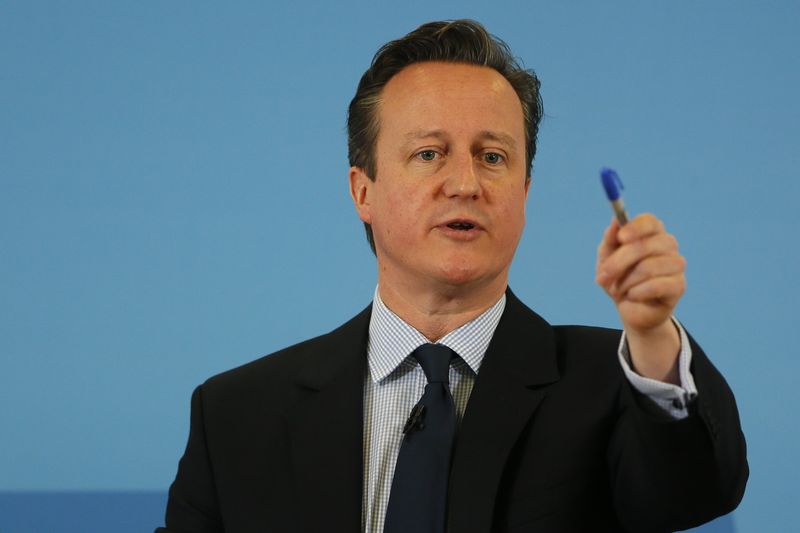By William Schomberg
LONDON (Reuters) - British Prime Minister David Cameron could hardly have asked for a better run of economic numbers ahead of May's tight election.
Yet he and his Conservative Party are nervously waiting to see if they can count on the turnaround in the economy to deliver electoral gold.
It all looks fairly rosy. Growth this year could be the strongest in nearly a decade, inflation is at a record low and pay is going up as unemployment falls. Britain's FTSE 100 blue-chip share price index has hit a record high.
Chancellor George Osborne has even been showered with praise by Angel Gurria, head of the Organisation for Economic Co-operation and Development, who told him on Tuesday: "My main message to you is: well done so far ... but finish the job."
But while some recent opinion polls have shown the Conservatives edging ahead of the centre-left Labour opposition party, most still suggest that the election will be too close to call.
This may be because most voters remain worse off than at the time of the last election in 2010, after what the Bank of England has described as the longest and deepest squeeze on earnings since at least the mid-1800s.
British economic growth last year was the strongest among the world's rich nations. But in late 2014, wages adjusted for inflation remained down about 10 percent from their levels before the financial crisis broke in 2008.
"Are we looking at economic growth, or are we looking at pounds in your pocket? Never before has it been so distinct in terms of those two factors," said Katherine Peacock, managing director of polling firm ComRes.
"Never before have people felt like ultimately the direction of the country and their own direction are going very, very differently."
SPLIT UK
The challenge for Cameron and Osborne to persuade voters that the recovery really is working for them has been made harder by a split between the winners and losers of the economic recovery, something Labour is emphasising in its campaign.
A survey by human resources organisation CIPD published this month showed two fifths of workers won significant pay rises last year but as many endured stagnant salaries.
Critics of the government's record on employment pointed to numbers released on Wednesday which showed an increase in the number of people employed on 'zero-hours contracts', which offer no guaranteed amount of work and pay.
Splits over the economy also stand out in opinion polls.
A survey by polling firm Opinium showed that 67 percent of likely Conservative voters rate the current state of the economy as good; only 22 percent of probable Labour voters shared that opinion.
Just as significant for Cameron, barely one in five people likely to vote for the anti-European Union UK Independence Party rate the economy as good.
Right-of-centre UKIP looks set to cost the Conservatives some seats at the election, making them a big factor in who emerges victorious in a finely balanced election.
And polling experts say the government's ability to win more credit for the recovery in time for the election remains a big challenge.
"It's interesting that the latest data has started to pick up again, and if that trajectory continues, it might not be too late," Charles Davis, a director of the centre for Economics and Business Research, a forecasting firm.

"But when you're coming from such a long period of incomes being squeezed, it's probably going to take a long period of real income increases for people to feel that the economy is really much more buoyant."